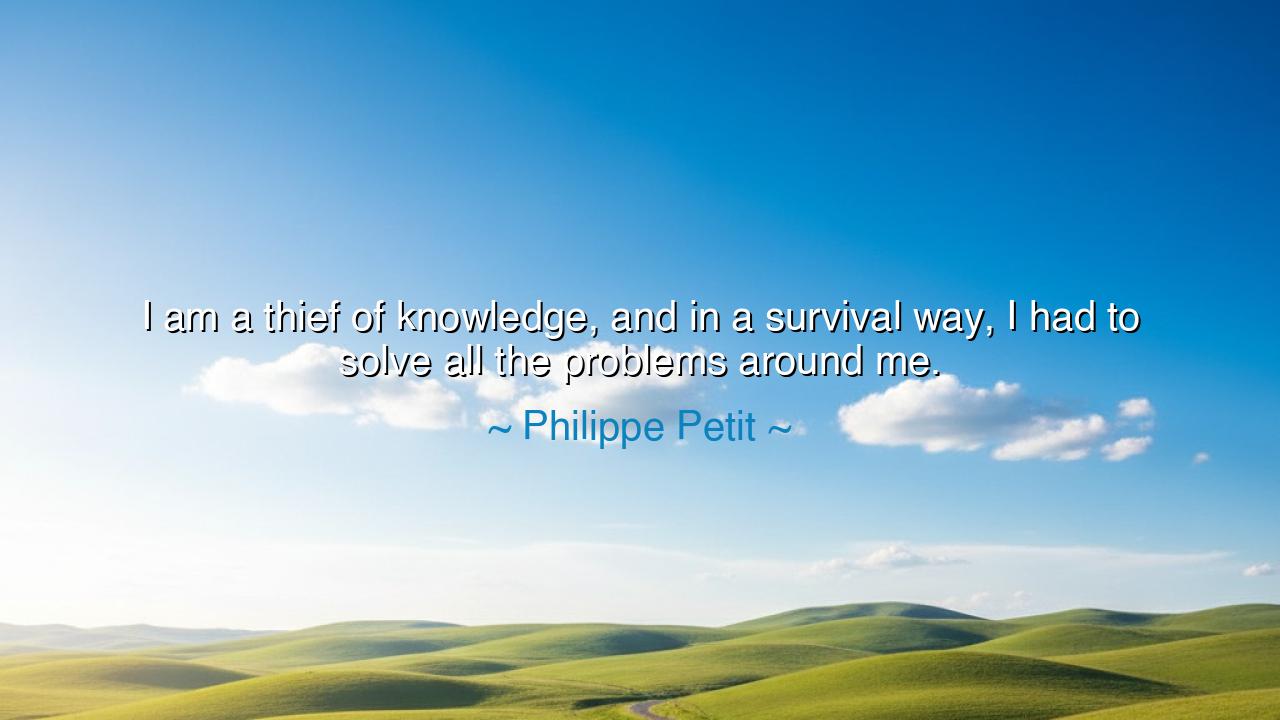
I am a thief of knowledge, and in a survival way, I had to solve
I am a thief of knowledge, and in a survival way, I had to solve all the problems around me.






“I am a thief of knowledge, and in a survival way, I had to solve all the problems around me.” — Philippe Petit
These words, spoken by Philippe Petit, the man who once walked a wire between the Twin Towers, ring with the fierce fire of self-made wisdom. His was not the learning of classrooms or manuals, but the learning of necessity — of hunger, danger, and the relentless pursuit of the impossible. When he calls himself a thief of knowledge, he speaks not of deceit, but of daring. He means that wisdom is not always handed to us by teachers or systems; sometimes, it must be stolen from the universe, seized from the silence between failures, from the cracks where no light yet shines. Petit’s life itself was a balancing act between art and survival — an eternal lesson that those who wish to master their world must learn to take knowledge wherever it hides.
Long ago, the philosophers of Greece said that wisdom begins in wonder. But for Petit, wisdom began in survival. Born in a world that offered him neither wealth nor stability, he built his education not from books but from observation. He learned by watching magicians, acrobats, engineers — by stealing every technique, every trick, every fragment of skill that could bring his vision to life. Like the artists of the Renaissance who studied anatomy in secret, he stole knowledge to create beauty. For him, life was a wire stretched high above the abyss, and knowledge was the only pole that could keep him balanced.
There is a story that defines him: in 1974, before dawn, Philippe Petit strung a cable between the World Trade Center towers, one hundred and thirty-five stories above the earth. No permission, no safety net — only wind, gravity, and will. As he stepped onto that wire, he embodied his own quote. Every law of man and nature declared it impossible, yet he walked. Why? Because he had learned, piece by piece, how to solve every problem around him. He learned the structure of buildings, the pull of metal, the rhythm of breath. His feat was not a stunt but a sermon: that knowledge belongs to the bold, to those willing to seek it wherever it may dwell.
The ancients would have called such a man a daemon, one who walks between the realms of gods and men. For Petit’s theft of knowledge was sacred — the same theft as Prometheus, who stole fire from Olympus to give warmth and light to humankind. It is the theft of every artist, inventor, and dreamer who defies the rules of comfort to reach for the infinite. The world rarely grants such souls permission, yet they move forward regardless, learning to survive through curiosity, courage, and creation.
But let it not be forgotten: Petit’s words speak also of survival. To solve all the problems around oneself is not merely art — it is endurance. It is the wisdom of the poor, the immigrant, the outcast, the self-taught. It is the knowing that no one will hand you a map, so you must draw your own. It is the power of adaptation — the ability to transform obstacles into teachers. In this, Petit becomes a symbol of all who must make their way in a world that often stands against them.
There is a fire in the thief of knowledge — a refusal to wait for permission to grow. The true learner does not ask, “Who will teach me?” but rather, “Where can I find what I need to know?” Such souls learn from the stars, from strangers, from silence. They study not only books, but failure. They observe, imitate, and experiment until the impossible bends to their will. This is the essence of mastery: to treat every problem not as punishment, but as a puzzle begging to be solved.
Thus, take this as a teaching for your own life: do not wait for wisdom to come to you. Seek it, steal it, chase it. Be shameless in your hunger for understanding. Watch others, question the world, and learn from all things — from the craftsman’s hands to the poet’s words, from the failures that break you to the victories that build you. For the one who is willing to steal knowledge is never truly poor, and the one who strives to solve their problems is never truly powerless.
Remember Philippe Petit, walking above the clouds — not as a madman, but as a messenger. His message is this: life itself is a high wire, and only those who learn as they walk shall not fall. Learn by watching. Learn by doing. Learn by daring. And when the world says you cannot — smile, steal the knowledge you need, and step forward into the wind.






AAdministratorAdministrator
Welcome, honored guests. Please leave a comment, we will respond soon